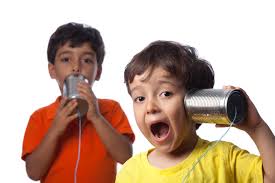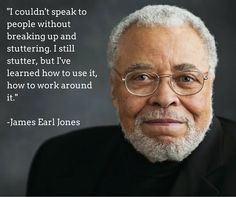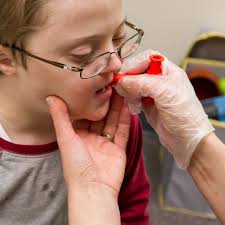Speech-Language Therapy

Therapy Innovations offers speech-language therapy to children and adults at our offices in Raleigh and Angier, North Carolina.
Speech-Language Pathologists (or Speech Therapists) help children and adults improve their oral motor and swallowing skills, communication effectiveness, social skills, and overall self-esteem. Speech-language therapy refers to the treatment of articulation/phonological disorders, language disorders, fluency disorders, voice/resonance disorders, and oral motor/feeding disorders.
Speech Sound Disorders:
 Children can have difficulty saying certain sounds clearly and their speech can sometimes be difficult to understand. A child who does not say sounds by the expected age may have a speech sound disorder. There are different types of speech sound disorders including Childhood apraxia of speech, articulation disorders, and phonological disorders. A speech-language pathologist (SLP) can help by testing your child’s speech. The SLP will listen to your child to hear how he says sounds and look at how your child moves their lips, jaw, and tongue as it relates to speech sound production.
Children can have difficulty saying certain sounds clearly and their speech can sometimes be difficult to understand. A child who does not say sounds by the expected age may have a speech sound disorder. There are different types of speech sound disorders including Childhood apraxia of speech, articulation disorders, and phonological disorders. A speech-language pathologist (SLP) can help by testing your child’s speech. The SLP will listen to your child to hear how he says sounds and look at how your child moves their lips, jaw, and tongue as it relates to speech sound production.
Language Disorders:
A language disorder is an impairment in one or more language domains; comprehension and/or use of a spoken, written, and/or other communication symbol system. Having trouble understanding what others say is a receptive language disorder. Having problems sharing our thoughts, ideas, and feelings is an expressive language disorder. It is possible to have both a receptive and an expressive language problem. Language disorders may occur across the lifespan, and symptoms may change over time. An SLP can assess your child’s language abilities and determine their strengths and needs.
Fluency Disorders:
 Fluency is the aspect of speech production that refers to the smoothness, rate, and effort in one’s speech. Stuttering is the most common fluency disorder. It is an interruption in the flow of speaking characterized by repetitions (sounds, syllables, words, phrases), sound prolongations, blocks (silent and audible), interjections, and revisions, which can affect the rate and rhythm of a child’s speech. These disfluencies may be accompanied by physical tension, negative reactions, secondary behaviors, and avoidance of sounds, words, or speaking situations. An assessment by an SLP is indicated when one or more of the following are observed. Please note that this is not an exhaustive list, and any factor may initiate a referral.
Fluency is the aspect of speech production that refers to the smoothness, rate, and effort in one’s speech. Stuttering is the most common fluency disorder. It is an interruption in the flow of speaking characterized by repetitions (sounds, syllables, words, phrases), sound prolongations, blocks (silent and audible), interjections, and revisions, which can affect the rate and rhythm of a child’s speech. These disfluencies may be accompanied by physical tension, negative reactions, secondary behaviors, and avoidance of sounds, words, or speaking situations. An assessment by an SLP is indicated when one or more of the following are observed. Please note that this is not an exhaustive list, and any factor may initiate a referral.
- There is a family history of stuttering or cluttering;
- The child exhibits negative reactions toward their disfluencies;
- The child exhibits physical tension or secondary behaviors (e.g., eye blinking, head nodding, etc.) during dysfluent periods;
- The child is experiencing negative reactions from family members or peers; and/or
- The child is having difficulty communicating his or her message in an efficient, effective manner.
Voice Disorders:
A voice disorder occurs when an individual’s voice quality (roughness, breathiness, and/or strain), pitch, and/or loudness differ or are inappropriate for an individual’s age, or gender. If a voice disorder is suspected, the evaluating SLP may refer you to an Ear, Nose, and Throat (ENT) doctor before treatment can begin. This is because some voice disorders are organic in nature (related to an individual’s structure) and speech therapy would not be the best treatment option.
Swallowing/Feeding Disorders:
 Childhood feeding disorders include problems gathering food and getting ready to suck, chew, or swallow it. Swallowing disorders can occur at one or more stages in the swallowing process including the oral, pharyngeal, and/or esophageal phases. It is ASHA’s position that “speech-language pathologists play a primary role in the evaluation and treatment of infants, children, and adults with swallowing and feeding disorders.” Working with children with feeding and swallowing disorders requires specialized knowledge and skills. Refer to our Dysphagia section under services for more information.
Childhood feeding disorders include problems gathering food and getting ready to suck, chew, or swallow it. Swallowing disorders can occur at one or more stages in the swallowing process including the oral, pharyngeal, and/or esophageal phases. It is ASHA’s position that “speech-language pathologists play a primary role in the evaluation and treatment of infants, children, and adults with swallowing and feeding disorders.” Working with children with feeding and swallowing disorders requires specialized knowledge and skills. Refer to our Dysphagia section under services for more information.
